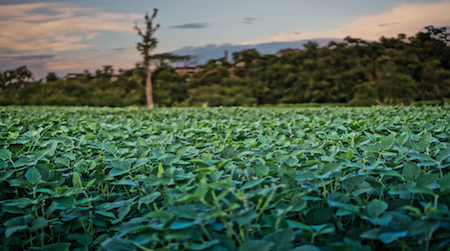By Rose Niu

With nearly half of its GDP directly tied to international trade, China is now the world’s second largest trading nation. Since 2001, a major driver of China’s international trade has been its “Going Global Strategy,” first articulated in the 10th Five-Year Plan. Under the strategy, China has encouraged its domestic enterprises to invest in foreign markets, seeking to access to natural resources and commodities in other countries and establish its firms as global players. In recent years, Chinese firms have made large investments in the developing world, including Asia, Africa, and South America. In fact, about 80% of Chinese FDI assets are invested in natural resources sectors and related infrastructure. With Chinese firms closing increasingly large deals in the developing world, the Going Global Strategy is making its mark on international trade.
In this context, a new Paulson Institute initiative to facilitate the export of soy produced legally and in environmentally sustainable ways from South America to China is a big deal. Why? As China’s demand for commodities—in this case, soy—has potential serious environmental impacts, such as deforestation and conversion of other natural habitats in the producing countries. But what if China instead becomes a proponent of environmentally responsible agricultural practices? If key Chinese players from public and business sectors send clear market demands that China wants to import commodities produced legally and in social and environmentally responsible ways, China could have a significant positive contribution to the conservation of the global biodiversity and ecosystems. The Institute believes that economic progress and environmental protection can and must go hand in hand, and the sustainable soy project is the perfect example of a smart and sustainable trade opportunity that can foster economic activity while preventing the further destruction of vital natural habitats.
The project, slated to take place over the next two years, seeks to increase the proportion of soy sourced from registered Brazilian farmers—meaning farmers who follow strict environmental legislations—and exported to China by international conglomerates Cargill and Bunge. Headed by the Paulson Institute with support from the Moore Foundation, the initiative will work to maximize the purchase of soy grown by farmers enrolled in the CAR system—a Brazilian regulation that ensures conservation of natural habitats. The stakes are high: Brazil serves as the largest source for China’s soy import, supplying some 26 million metric tons, which was 42% of China’s total import volume in 2012. The Institute will collaborate on the project with its partners The Nature Conservancy, Solidaridad-China and the World Wildlife Fund.
With China increasingly “Going Global” to satisfy growing domestic demand for food, fuel, fiber commodities and other natural resources, South America—and many other developing countries—is positioned to play a large role in China’s next development phase. Indeed, the developing world holds many of the commodities China seeks to build a thriving society. But that trade need not come at a high global environmental cost. By encouraging initiatives such as the sustainable soy project, China can play a positive role in promoting sustainable development in its trading partner countries. While China must still address key issues before becoming a fully responsible global merchant, initiatives like the sustainable soy trade represent the first steps for the world’s largest trading force.


